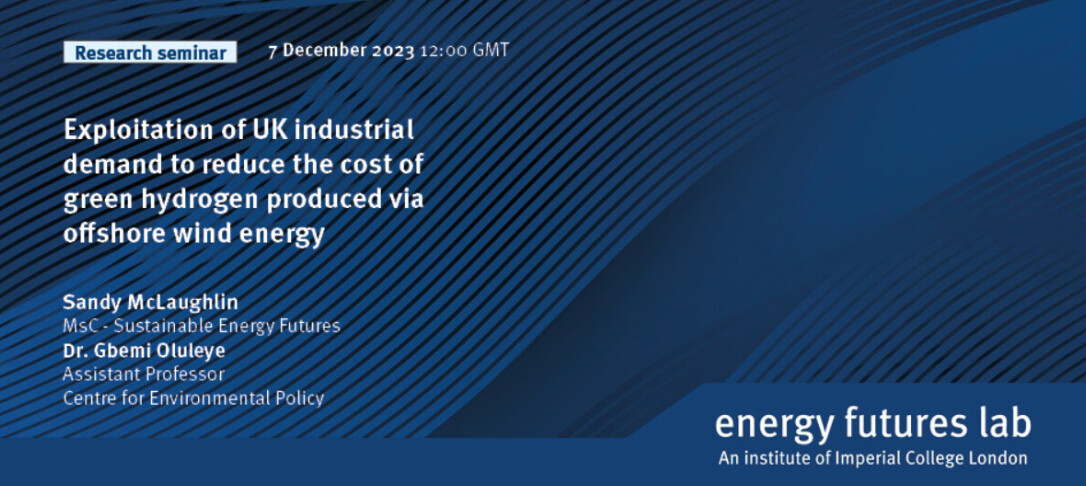
Exploitation of UK industrial demand to reduce the cost of green hydrogen produced via offshore wind
Fossil fuels remain the dominant energy source for the industrial sector in the United Kingdom (UK), accounting for 14% of national greenhouse gas emissions in 2022. However, industry is a necessary evil, vital to creating products for modern life and moreover, the low carbon technologies for other sectors. Industry simultaneously facilitates and complicates the net zero transition, requiring technology innovation via accelerated and targeted policy intervention to decarbonise whilst satisfying ever-increasing demand and maintaining economic competitiveness.
Hydrogen – particularly green hydrogen produced via offshore wind (OSW)-powered electrolysis – offers a solution to bridging the gap between an expanding renewable electricity capacity and the nation’s hard-to-abate industrial sector, driving decarbonisation as a net-zero emission fuel and feedstock. The UK targets a total hydrogen production of 10 gigawatts (GW) by 2030, comprising equal parts green and blue hydrogen, and a cumulative OSW capacity of 50 GW, offering countless financial incentives to stimulate a supply push. Nonetheless, green hydrogen faces several barriers to industrial adoption – chiefly the cost – which remains too elevated to compete with blue and grey hydrogen.
The following presentation discusses a multi-layer methodology to assess whether the use of curtailed OSW energy and the exploitation of industrial demand in the UK – incentivised by policy intervention and integrated with learning – are sufficient to narrow the cost disparity between green hydrogen and its alternatives, sustain economic competitiveness, and stimulate widespread adoption from 2025 through 2050. The analysis comprises two key steps: (1) an evaluation of whether the supply of curtailed green hydrogen is adequate for the projected increase in industrial demand; (2) the development a novel multi-period mixed-integer non-linear representation of a market penetration assessment (MPA) applied to UK industry.
Biography:
Dr. Gbemi Oluleye is an assistant professor at the Centre for Environmental Policy, and a member of the Sargent Centre for Process Systems Engineering Imperial College London. She leads a research group on Modelling for the Adoption of Alternative Technological Systems (MAATS Lab). ATS are alternative fuels and technologies required to decarbonise manufacturing and contruction. Gbemi’ s research and practise synthesises cost-effective adoption pathways for ATS from interventions driven by innovations in technologies, business models and policy. She has a multidisciplinary research experience and expertise at the interface of Technology, Policy, and Economics, and over 10 years combined experience in industry (design, manufacturing, and consulting), and academia.
Sandy McLaughlin is a chemical engineer by training but spent two years in the financial services sector between undergraduate and postgraduate studies. He’s consolidated his multi-disciplinary knowledge and experience over the past year at Imperial College London and looks forward to starting a new role as an Energy and Process Industries Strategy Consultant at Kearney post-graduation. Sandy is finishing an M.Sc. in Sustainable Energy Futures at Imperial College London.
About Energy Futures Lab
Energy Futures Lab is one of seven Global Institutes at Imperial College London. The institute was established to address global energy challenges by identifying and leading new opportunities to serve industry, government and society at large through high quality research, evidence and advocacy for positive change. The institute aims to promote energy innovation and advance systemic solutions for a sustainable energy future by bringing together the science, engineering and policy expertise at Imperial and fostering collaboration with a wide variety of external partners.


